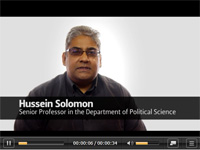Latest News Archive
Please select Category, Year, and then Month to display items
12 October 2020
|
Story Arina Engelbrecht
|
Photo Supplied
 Arina Engelbrecht from Organisational Development and Employee Well-being believes physical activity has a number of benefits for one’s health, including stress relief.
Arina Engelbrecht from Organisational Development and Employee Well-being believes physical activity has a number of benefits for one’s health, including stress relief.
Being physically active plays a big role in preventing the development of mental-health problems and in improving the quality of life of people experiencing mental-health problems.
Treatment for depression
Physical activity can be an alternative treatment for depression. It can be used as a stand-alone treatment or in combination with medication and/or psychological therapy. It promotes all kinds of changes in the brain, including neural growth, reduced inflammation, and new activity patterns are formed that promote feelings of calm and well-being. It releases endorphins – powerful chemicals in the brain that energise your spirit and make you feel good.
Physical activity can be very effective in relieving stress. Research in adults has found that physically active individuals tend to have lower stress levels compared to individuals who are less active. It also leads to improved sleep. When a person sleeps better and feels more rested, overall quality of life improves. They cope better with daily life stressors.
Reduce Alzheimer's risk
Regular physical activity can reduce your risk of developing Alzheimer's disease by up to 50%. It can also slow down further deterioration in those who have already started to develop cognitive problems. It stimulates the brain’s ability to maintain old connections as well as to make new ones.
A study asked people to rate their mood immediately after periods of physical activity (e.g. going for a walk/run, cycling, doing housework) and periods of inactivity (e.g. reading a book or watching television). Researchers found that participants felt more content, more awake, and calmer after being physically active compared to after periods of inactivity.
In conclusion, people who are physically active feel a sense of well-being, feel more energetic throughout the day, sleep better at night, have sharper memories, and feel more relaxed and positive about themselves and their lives.
“Being physically active not only changes your body, it changes your mind,
attitude, and your mood.” – Arina Engelbrecht
Islam. Boko Haram. Terrorism. Prof Hussein Solomon offers insight.
2014-09-04
 Photo: en.wikipedia.org |
Prof Hussein Solomon introduction: video

When it comes to politics, there are lots of negative talk, but without any action or solutions.
However, with Prof Hussein Solomon, Senior Professor at the UFS’s Department of Political Science, there is not a lot of talk without solutions, but great activity regarding research work published on Islam, the Middle East, Boko Haram and environmental issues in Africa.
Prof Solomon’s most recently published article, Five Lessons Learned from Ejecting Islamists in Mali, was published in the Research on Islam and Muslims in Africa (RIMA) Policy Papers on 1 September 2014.
(https://muslimsinafrica.wordpress.com/2014/09/01/five-lessons-learned-from-ejecting-islamists-in-mali-professor-hussein-solomon/ ).
“The terrorist threat is mounting with each passing day in Africa with Islamist terror groups exploiting the ungoverned spaces, the availability of weapons, porous borders, an incompetent security apparatus and corruption in the political establishment,” Prof Solomon writes in this paper.
“It is therefore important, to explore cases where attempts have been made to dislodge the Islamists with a view to learn lessons so that future interventions do not repeat the failures of the past. This paper explores the intervention and lessons which could be learned from French and Economic Community of West African States (ECOWAS) attempts to oust Islamists in northern Mali in 2013.”
Prof Solomon holds a DLitt et Phil (Political Science) from the University of South Africa (UNISA). In 2011, he was Visiting Professor at the Osaka School for International Public Policy (OSIPP). In 2007 and 2010 he was Visiting Professor at the Global Collaboration Centre at Osaka University in Japan and in 2008 he was Nelson Mandela Chair of African Studies at Jawahrlal Nehru University in New Delhi, India. In 1994, he was Senior Visiting Fellow at the Department of War Studies, King’s College at the University of London. He is currently a Visiting Fellow at the MacKinder Programme for the Study of Long-Wave Events at the London School of Economics and Political Science in the United Kingdom.
He is also a Senior Associate for the Israeli-based think tank Research on Islam and Muslim in Africa and a Senior Analyst for WikiStrat.
More articles by Prof Solomon:
Boko Haram and the case of the abducted school girls
http://muslimsinafrica.wordpress.com/2014/05/14/reinvigorating-the-fight-against-boko-haram-professor-hussein-solomon/
Australian Broadcasting Corporation interview on Boko Haram
http://www.abc.net.au/radionational/programs/counterpoint/boko-haram/5657882
Reflections on Inga 3 and Beyond
www.saccps.blogspot.com
Nile and Okavanga River Basins (pdf)
Nigeria’s Boko Haram: Beyond the rhetoric (pdf)